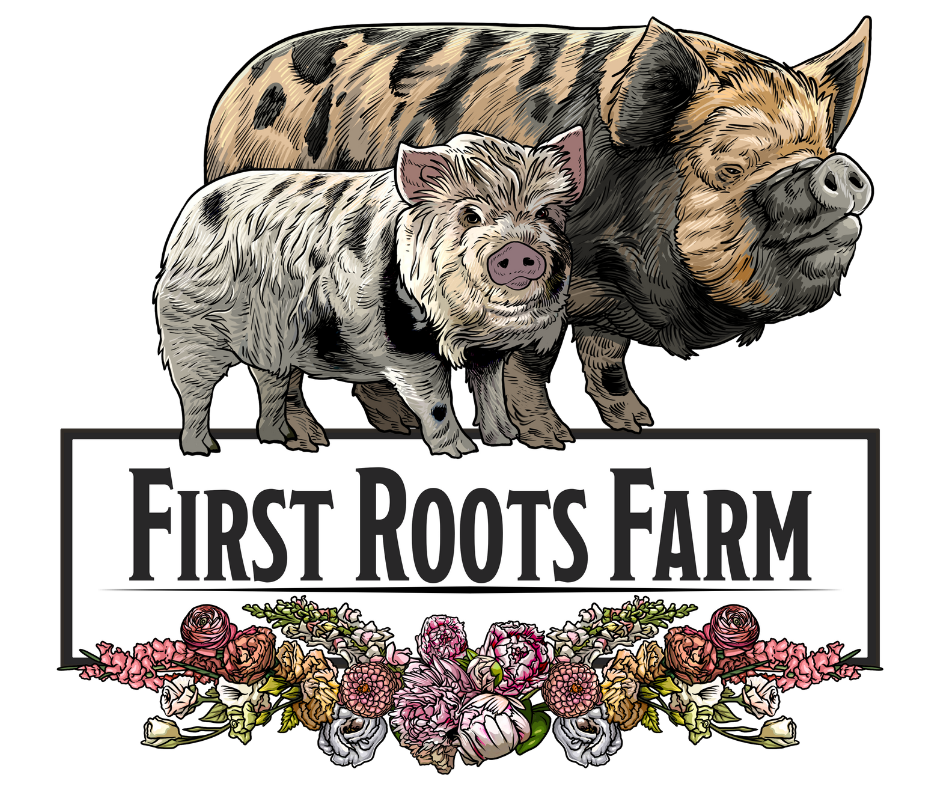We provide our community with a genuine farm-to-table experience.
We offer AKKPS registered Kunekune breeding stock, piglets, roasters, and pork by the cut. Allowing you to know exactly where your pork comes from and how it's raised.
Why choose First Roots Farm?
Here’s what sets us and our Kunekunes apart:
Nutrient-Rich
Pasture-raised Kunekune pork offers superior nutritional benefits compared to conventionally raised pork. It contains 90% more vitamin E, significantly higher levels of Omega 9, 33% more Omega 3, and 66% more Omega 6 fatty acids. Additionally, it boasts 2.8 times more vitamin D than commercial pork, making it a healthier and more nutrient-rich option.You Deserve Better Food
We prioritize quality, care, and sustainability in everything we do. Our dedication to ethical farming practices ensures that you receive the finest, most flavorful products. Reconnect with the source of your food and enjoy the exceptional taste and peace of mind that comes from knowing that your food truly deserves the best.Personalized Mentorship
Dedication to quality is in everything we do. Our 200 in 12 breeding program ensures robust, healthy Kunekune pigs that thrive. We provide personalized mentorship, guiding you through every step of Kunekune pig ownership. Whether you are new to raising pigs or looking to expand your herd, you will always have our support.Wanting to add Kunekunes to your farm?
To purchase your next piglet or to join the waitlist for our future Kunekune litters.
Kunekune FAQ | Pastured Pork
Pastured pork refers to pigs that are raised outdoors on pasture, where they can forage, graze, and engage in natural behaviors. This approach promotes animal welfare and results in healthier, more flavorful meat.
Our pigs are raised on open pasture, where they have ample space to roam, forage, and root. They are provided with supplemental feed to ensure a balanced diet, fresh water, and shelter to protect them from extreme weather. Additionally, they enjoy seasonal treats like fruits and vegetables.
Pastured pork is typically more flavorful and nutritious than conventional pork. Raising pigs on pasture promotes better animal welfare, reduces environmental impact, and supports sustainable farming practices.
You can purchase our pastured pork directly from our farm or through our website. We offer a variety of cuts, as well as whole or half pigs for those interested in larger quantities.
Yes, we offer whole and half pigs for sale. This option is ideal for families or individuals who want to stock up on high-quality pork and enjoy a variety of cuts.
Our pigs are humanely processed at a USDA-inspected facility. The pork is then carefully packaged and labeled, ensuring freshness and quality. We offer custom processing options to meet your specific preferences.
We prioritize the health and welfare of our pigs by providing them with a natural, stress-free environment. They have access to clean water, nutritious food, and shelter. Regular health checks and a low-stress handling approach ensure their well-being.
Pastured pork is known for its superior flavor, tenderness, and marbling. The varied diet and outdoor lifestyle contribute to a richer, more complex taste compared to conventional pork.
Yes, we are happy to accommodate special orders for specific cuts or quantities. Please contact us to discuss your needs and preferences.
Yes, we are proud to supply high-quality pastured pork to restaurants. If you are a restaurant owner or chef interested in featuring our pork on your menu, please contact us directly. We offer bulk purchasing options and can work with you to meet your specific needs.
Kunekune FAQ | Pastured Pork Nutritional Information
The Empire Kunekune Pig Association (EKPA) is a reputable organization dedicated to promoting and preserving the Kunekune pig breed. They conduct research, provide educational resources, and support Kunekune pig breeders and owners. EKPA is respected for its commitment to breed standards, scientific research, and comprehensive educational outreach. Their initiatives are backed by experts in the field, ensuring reliable and credible information.
- The testing aims to assess and compare the nutritional content of Kunekune pork to commercial pork.
- Two samples, commercial pork and Kunekune pork, were tested blind at COD SGS-AGRI in Canada.
- Tests included Nutritional Labelling Package CDN, Vitamin D, and Vitamin E.
90-99% MORE VITAMIN E
Vitamin E is an antioxidant that protects cells from free radicals. Vitamin E is important for the proper function of many organs in the body. It helps keep the immune system strong against viruses and bacteria.
33 % MORE OMEGA 3
Omega-3 fatty acids are "healthy fats" that may support your heart health. One key benefit is helping to lower your triglycerides. Omega-3 fats have been show to help prevent heart disease and stroke, may help control lupus, eczema, and rheumatoid arthritis, and may play protective roles in cancer and other condition
66% MORE OMEGA 6
Omega 6 lowers harmful LDL cholesterol and boosts protective HDL. It also helps keep blood sugar in check by improving the body's sensitivity to insulin.
90% MORE OMEGA 9
Omega 9 increases "good" HDL cholesterol levels and decreases "bad" LDL cholesterol levels. This helps eliminate plaque buildup in the arteries, which causes heart attacks and strokes.
2.8X MORE VITAMIN D
Vitamin D helps to protect against osteoporosis and heart disease. It is also essential for immune function, mood regulation, and numerous other bodily processes, making it a crucial nutrient for overall well-being.
Kunekune pork showed similar or higher nutritional content compared to commercial pork, based on USDA data and findings from the Food Animals Concerns Trust and a 2017 SARE GRANT study.
For more information, please visit the EKPA Nutritional Testing page.
Kunekune FAQ | Kunes 101
Kunekune pedigree names can be confusing at first. Each litter has a dam and sire, with specific line names. Piglets inherit their line name by sex, from their mother or father. This naming helps track the bloodline by sex back to the original namesake.
Kunekunes are friendly and docile, but they are also valued as a meat breed. Utilizing them for meat ensures the best animals are bred and maintains high-quality Kunekune traits. Kunekune pork is a marketable niche product. Keeping Kunekunes as pets is also perfectly fine.
Kunekunes vary in size depending on their lineage. They are smaller pigs but not miniature. We breed for 200 in 12 genetics. We aim for our Kunekunes to reach 200 lbs by 12 months with proper diet and nutrition, and they can grow up to 300+ lbs when fully mature.
What are your farm goals?
Are you experienced with Kunekunes and looking for genetics known for producing consistent growth rates? Or are you new to Kunekune pigs and unsure where to start?
We offer personalized mentorship, providing as much or as little guidance as you need. Our goal is to match you with Kunekunes that align with your objectives and fit your specific needs.
Kunekune FAQ | Registration
Only breeders can register pigs. Ensure you buy registered pigs if you want papers. If you own a registered pig that has piglets, you can register the piglets if both parents are registered. This involves completing litter notification, DNA verification, and submitting a registration application.
No, we only register breeding stock. This ensures that only the highest quality animals contribute to the future of the breed.
Gilts that are not retained for breeding are part of our pastured pork program. They are raised with care to provide high-quality, sustainable pork. The boars that are not selected for breeding are borrowed and sold either as pets or for our pastured pork program. This ensures our Kunekunes are utilized in a manner that aligns best with the needs of our farm and our customers.
The growth rate is a critical factor in our selection process. Pigs that can achieve our 200 in 12 growth standard demonstrate strong, efficient genetics. This growth rate ensures that the pigs are healthy and have the potential to pass on desirable traits to their offspring. Pigs that do not meet this growth standard are typically not considered for breeding and may be redirected to our pastured pork program.
Yes, we do sell borrows as pets. They are great companions and still possess the friendly and docile nature of the Kunekune breed. If you do not already have pigs, please be aware that you will need to purchase two borrows as they are highly social animals and need another pig friend.
Registration confirms that your pigs are 100% Kunekune and helps preserve the breed. Registered Kunekunes are generally more valuable and allow for tracking of lineage.
Purchasing a registered Kunekune offers several significant advantages:
1. Verified Pedigree:
- Assurance of Purity: Registration confirms that your pig is 100% Kunekune, guaranteeing the breed's authenticity and the specific traits that Kunekunes are known for.
- Lineage Tracking: Registered pigs come with documented lineage, providing transparency about their genetic background and allowing you to trace their ancestry.
2. Breed Preservation:
- Maintaining Standards: By purchasing registered Kunekunes, you are supporting the preservation of the breed and ensuring that only pigs meeting specific standards contribute to the gene pool.
- Selective Breeding: Registered pigs are typically the result of careful selection for desirable traits, such as conformation, temperament, and health, helping to maintain and improve the breed's overall quality.
3. Enhanced Value:
- Higher Resale Value: Registered Kunekunes often have a higher market value compared to unregistered pigs.
- Breeding Opportunities: If you plan to breed Kunekunes, having registered pigs allows you to produce registered offspring, which can be sold at a premium.
4. Access to Resources:
- Breeder Support: Reputable breeders of registered Kunekunes often provide ongoing support and mentorship, helping you with any questions or challenges you may face.
- Community and Networks: Being part of the registered Kunekune community connects you with other breeders and owners, offering valuable networking opportunities and shared knowledge.
5. Health and Quality Assurance:
- Health Standards: Registered pigs are usually bred from stock that has been carefully monitored for health issues, reducing the risk of genetic defects and ensuring stronger, healthier animals.
- Conformation and Temperament: Registration bodies often have standards for conformation and temperament, ensuring that registered pigs are well-suited for their roles, whether as pets, breeding stock, or for pastured pork.
Investing in a registered Kunekune means you are supporting the long-term viability and quality of the breed, ensuring you receive a Kunekune pig that meets these high standards.
Kunekune FAQ | Food + Housing
Kunekunes thrive on quality pasture and hay but need a balanced pig feed suitable for their age and needs. Avoid feeding them goat, chicken, or cattle feed due to high salt content. Supplement their diet with fruits and vegetables as occasional treats. If you are local to the Oconomowoc, WI area, our feed is purchased at Merton Feed. They have created a special mix for our herd and will gladly help you with your Kunekune feed needs.
Feed Kunekunes based on their body condition, aiming for 2-3% of their body weight daily plus free-choice hay/grass. Adjust feeding amounts based on the pig's condition and life stage.
Our farm uses Port-a-Huts for shelters and farrowing. These versatile huts are adapted seasonally for the comfort of our pigs. In the summer, we remove the half-fronts to provide better ventilation, while in the winter, we add the half fronts as a windbreak and add extra bedding.
Shelters can range from simple calf hutches to advanced farrowing barns. Ensure shelters protect from weather extremes and provide adequate bedding. Farrowing areas should have protection from elements and be equipped with heat sources for piglets if needed.
Yes, Kunekunes can coexist with other animals. Our Kunes will often share their meals with our free-range chickens.
Kunekunes are highly social animals and require a fellow pig friend as a companion. If you do not already have a herd of pigs, please plan on purchasing two Kunekunes from us.
You can choose from various combinations, including:
- Two registered gilts
- Two registered boars
- One registered gilt and one barrow
- One registered boar and one barrow
If you do not already have a herd that can accommodate the appropriate companions, we cannot sell you only a registered gilt and a registered boar.
If you are looking for a registered breeding trio, you will need four piglets: two registered gilts, a registered boar, and a barrow.
However, if you already have a Kunekune herd that can provide the necessary companionship, we will gladly provide you with a single registered gilt, a boar piglet, or both.
Typically, Kunekunes are less inclined to root than other pigs due to their upturned noses and preference for grass. However, some may root to find grubs or minerals.
Kunekune FAQ | Health
Establish a relationship with a vet before an emergency arises. If you notice something unusual with your pig (such as lethargy, lack of appetite, vomiting, etc.), we recommend consulting your veterinarian or mentor/breeder immediately, especially in an emergency. Online searches or social media can often provide unreliable information. It's important to establish a relationship with a veterinarian before an emergency occurs, so they are familiar with you and your animals and understand what is 'normal' for them.
Vaccination needs depend on your area and potential health threats. Consult a local farm veterinarian and your breeder for recommendations.
Hair loss can result from shedding, mites, zinc deficiency, or mange. Change the pig’s bedding and consider deworming. If the issue persists, consult a veterinarian.
Regular deworming is recommended. Consult your vet and consider a fecal analysis to determine the appropriate schedule and type of wormer.
Kunekune FAQ | Breeding + Reproduction
Separate them for a period to increase interest. Introduce the gilt/sow to the boar’s area when ready for breeding. Use fence-line contact to stimulate cycles. Competitive behavior from another boar can also help.
Kunekunes can reach sexual maturity around 8 months, but breeding should be based on size and structure. Separate gilts and boars by 6 months to prevent unwanted pregnancies.
Kunekune sows are pregnant for an average of 116 days, or approximately 3 months, 3 weeks, and 3 days.
During the last trimester, increase the sow’s ration by 25-50%. Maintain good condition during the initial stages of pregnancy.
Give the Gift of Flavor and Quality
Our cards can be used for purchasing Kunekunes and pastured pork – a perfect choice for those who appreciate farm-to-table goodness.
We love to talk beautiful blooms and Kunekunes.
For specific questions, send us a message!
First Roots Farm is owned by Janell and Javier Vera. Drop us a line and let's chat— we're just a pig's squeal away from answering your questions!













